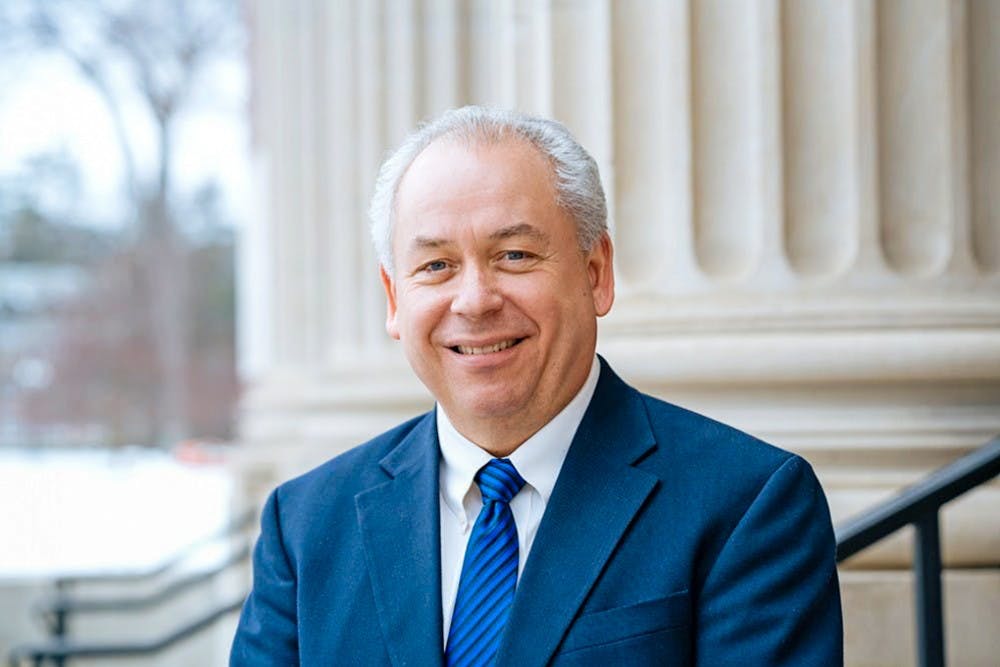Documentary co-produced by NAS professor wins Emmy
 |
| Duthu began his involvement in the project as a consultant. |
“Dawnland” tells the story of indigenous child removal in the United States during the 20th century — when child welfare authorities forced Native American children to live in non-Native foster care, adoptive homes or boarding schools. The documentary follows the first so-called Truth and Reconciliation Commission in the United States for the contemporary Wabanaki community in Maine.
Duthu said that he believes “Dawnland” serves as a cautionary tale about “state power being misdirected against vulnerable populations.”
Currently leading a the Native American Studies Domestic Studies Program in Santa Fe, NM, Duthu said he regretted that he was not able to join his team at the awards ceremony in New York City, but he described the ceremony as “wonderful,” adding that he was later told that many Wabanaki people featured in the documentary were present at the ceremony.
Duthu said that his involvement with the project began when he was brought on as a consultant to help the production team with legal and policy aspects of the federal Indian Child Welfare Act. Later on, as Duthu continued to help the team with research, fundraising and resource connections, he was invited to become a co-producer.
“Dawnland” co-director Adam Mazo said he was introduced to Duthu by Native American studies professor Colin Calloway and expressed his gratitude for having Duthu on the team.
“His way of distilling complex ideas into more easily digestible pieces is super helpful for us, as we are not academics,” Mazo said.
According to Duthu and Mazo, one of the most important accomplishments during the production of “Dawnland” was finding the footage of a U.S. Senate hearing on the Indian Child Welfare Act that occurred in the 1970s. At the hearing, Native American witnesses testified that children were abused and forced into foster homes.
Duthu said that when the team was reading through the transcript of the hearing, they noticed that a senator asked a witness if the light was too bright. That was when the team realized the hearing had actually been videotaped. Following an extensive effort from many members inside and outside of the film team, they finally were able to discover the footage at a local television station in Boston.
“This took a lot of patience from the team, and a lot of hard work,” Duthu said.
Mazo said he was inspired to direct “Dawnland” after he first heard about the Truth and Reconciliation Commission in 2013. He added that this commission was “historic,” as it was the first of its kind in the United States sanctioned by the state and tribal governments. He also noted that “Dawnland” was related to a 2010 documentary he directed, “Coexist,” about forced reconciliation after the 1994 Rwandan genocide.
“We also want to acknowledge genocide in this country’s history,” Mazo said. “We hope [‘Dawnland’] is going to put a greater spotlight on the story of the Wabanaki people and the reality of indigenous child removal that continues in this country today.”
“Dawnland” senior advisor and co-founder of the Akomawt Educational Initiative Chris Newell described “Dawnland” winning an Emmy as a “surreal experience.” A member of the Wabanaki tribe that “Dawnland” documents, Newell said that he believed it was his responsibility to help the story of his community “to be told correctly.”
Newell, who is now involved in multiple educational projects focusing on the education of Native American history, said he valued the opportunity that “Dawnland” provided to tell the story of the Wabanaki people to a larger audience.
“I was just part of a team that helps tell the story, but the story belongs to the people that told their truth and they are the ones that this recognition should really reflect,” Newell said.
Native Americans at Dartmouth co-president Elsa Armstrong ’20 said she watched some “Dawnland” clips in Duthu’s class NAS 30.3, “Native American Literature and Law” last winter. She said she appreciated that the clips were able to show history from an indigenous perspective.
Evan Barton ’20 described Duthu’s teaching as “phenomenal,” saying that Duthu was able to “challenge [students] appropriately” to “inspire creative processes.” Though he has not watched “Dawnland,” Barton said he was really eager to see the film to learn about the impact of child foster care on indigenous communities.
Although Duthu said that he was not a filmmaker and does not currently plan to pursue more filmmaking, he added that he was open to new opportunities.
“I never expected to be involved with something as significant as ‘Dawnland,’ so I am always open to opportunities where I might be able to be helpful,” Duthu said.
“Dawnland” was screened on the Dartmouth campus last October in Loew Auditorium.























No comments:
Post a Comment
Please: Share your reaction, your thoughts, and your opinions. Be passionate, be unapologetic. Offensive remarks will not be published. We are getting more and more spam. Comments will be monitored.
Use the comment form at the bottom of this website which is private and sent direct to Trace.